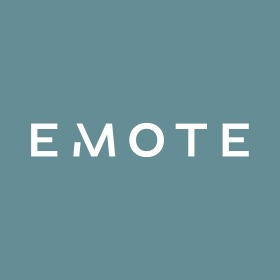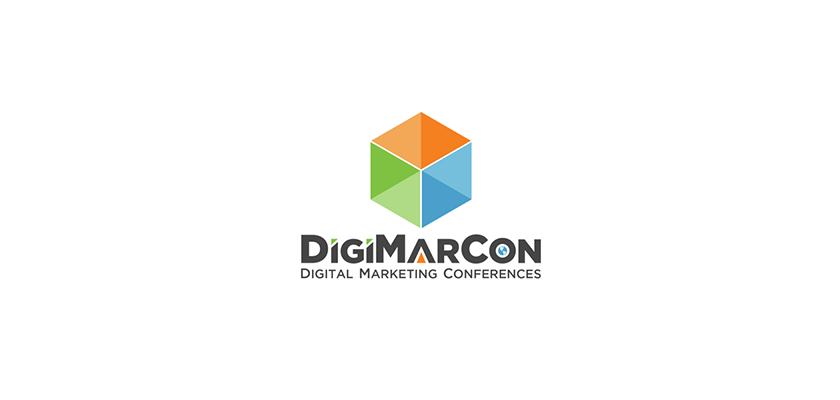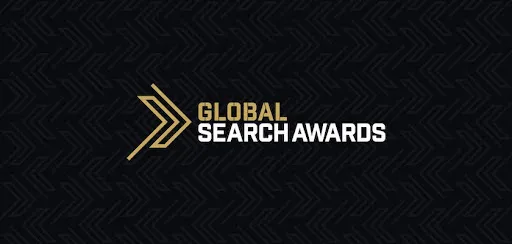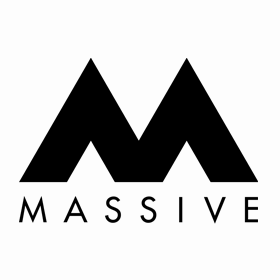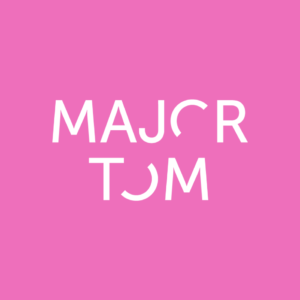
7 Ways to Spot a Great Agency Client Relationship
Excited to start working with a new client, but unsure how to best build a successful agency client relationship? You’re not alone.
When you’ve been around long enough – and sat on both sides of the table – you begin to realize that it’s not just the quality of work that matters, but also the nature of the relationship a client has with an agency.
If that relationship is strong and constructive, then almost anything is possible. If it is toxic or simply workmanlike, nothing will be done well. This understanding should inform our thinking when we choose digital marketing agencies – in any area. After all, when we allow a third party to contribute to a vitally important part of our business, we are placing a lot of trust in that organization. Their skill is not the only – or even the main – issue.
We want to know they are taking the relationship seriously and adding as much value as possible. And it’s not just at the moment we choose. It’s wise to continually evaluate any relationship to establish whether you are really getting what you want and whether the partner in question is really committed to your success.
Why is Agency Client Relationship Important?
Imagine a symphony orchestra where each instrument competes for attention, instead of harmonizing to create a masterpiece. That’s what a successful agency client relationship feels like. Conversely, a strong partnership is like a well-rehearsed ensemble, where each member plays their part flawlessly, amplifying the long term success of the whole team members.
Effective agency client partnerships require a shared rhythm, a seamless flow of communication and collaboration. This rhythm encompasses meetings, reports, and even daily interactions. It’s about ensuring everyone is on the same page, with briefs smoothly evolving into tangible deliverables. Equally crucial is establishing clear metrics for success. Both parties must agree on how effectiveness will be measured, ensuring alignment and removing room for ambiguity. As AgencyAnalytics’ recent survey highlights, 36% of agencies point to effective communication and transparency as the key factor driving client retention, underlining the importance of open dialogue and trust in fostering a successful partnership.
What Makes a Good Client Agency Relationship?
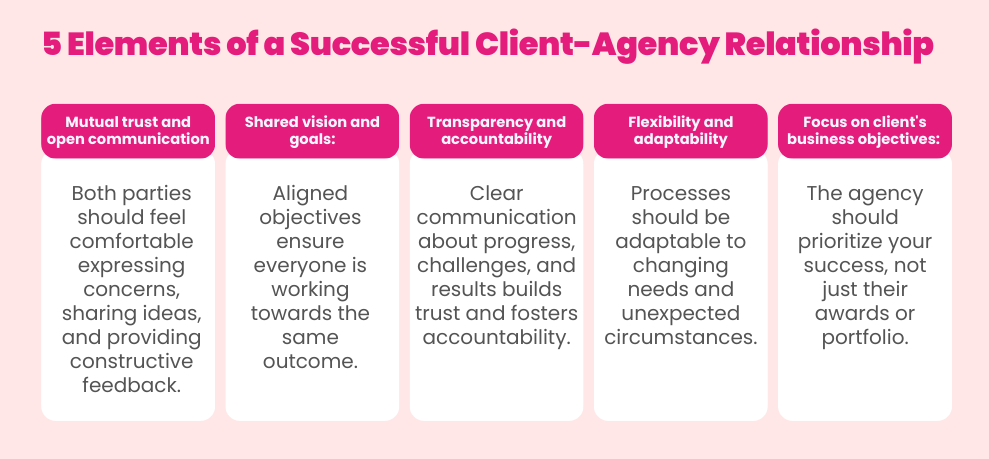
A good client agency relationship is characterized by mutual trust, open communication, and a shared vision. This partnership thrives on honesty, where both parties are comfortable expressing their opinions and concerns. An agency that actively listens to its clients and incorporates honest feedback demonstrates a commitment to the project’s success. Furthermore, leveraging tools like project management and time tracking software can streamline workflows and enhance transparency and as a result solidify this relationship.
Now, let’s dive deeper into specific signs that your agency client relationship is on the right track:
1) Honesty is Prioritized Over Flattery
Nobody wants to tell a client that their idea is a bit of a turkey. But a good agency has to. If you have frank and meaningful conversations with a partner in which they are willing to stand their ground (whilst remaining respectful!) that’s a good sign – not a bad one.
We turn to external agencies for a variety of reasons, but one of them is their possession of expertise, skills, and knowledge that we don’t have.
So we have to listen, and we need to be aware that the easy thing for any partner to do is flatter. Flattery might make us feel good in the short term, but it ultimately means we are short-changed.
Perhaps worse, it can lead to an agency agreeing with the client and then disregarding that agreement when it comes to execution.
In this situation, where the client does not even know what is happening, it is fair to say the relationship has completely broken down.
In short: beware of the agency that nods and smiles only.
They aren’t doing their job.
2) You Have Access to the Right People
It is perhaps the oldest trick in the book. After meeting a variety of extremely impressive people during the sales process, they gradually disappear once the contract is signed.
In some less scrupulous industries, this is almost standard practice. But it’s never really good enough. Ideally, when in a sales process you should ask to meet the individuals handling the account after the deal is done.
But at the very least, a sensation that you appear to be interacting with more junior people every passing day is a red flag.
On the flip side, if the agency you work with continually brings new people with new skills to the table – you are probably on to a good thing.
3) A Process Exists (But Can Be Adapted)
If your relationship with an agency tends to involve throwing ‘jobs’ over the wall and waiting for results to come back, that isn’t a good sign.
Instead, every project should be clearly scoped, and both the client and agency should understand the process that will be followed in order to deliver predictably outstanding results.
Having a process, however, doesn’t mean a lack of flexibility. If something needs to be done and needs to be done as a matter of urgency, then in an ideal world that should happen. Assuming, of course, it really is urgent!
Similarly, a good agency should use a process to structure work but acknowledge that sometimes that structure has to be broken.
If a client changes their mind after signing off wireframes, for example, a good agency should attempt to work around that challenge rather than refuse to go back and look again because of ‘the process’.
4) Your Needs are Emphasised Over Theirs
Surely every agency wants what is best for their client? Well, not really. Most obviously, in many cases, an agency wants to collect as much money as possible for doing as little as possible (nobody likes to put it that way, but it helps to remember this is often the case).
If you assume your agency is doing next to nothing, you are probably starting from the right place.
But in addition, the priorities when it comes to actual work can differ. Agencies like awards and work they can show to potential new clients. Clients want something that does the job for them.
Those competing interests are not always aligned.
The sign of a good agency is a desire to focus on the clients’ business objectives and frame conversations about success and failure in those terms.
Does it really matter that your agency put on their black tie and collected an award for their work on your behalf – when your own KPIs are down? Not really.
5) Communication Lines are Open
Communication is at the heart of any good relationship. So it is with clients and agencies. If you don’t speak to your agency from one month to the next, there is certainly a problem or issue.
At the very least you should be expecting some form of regular conversation and updates on performance.
Better again, of course, is ongoing organic interaction.
If an agency is to be considered almost as a part of the client organization, that is really the standard we should be aiming for: anything less gives a little too much opportunity for expectations to diverge and misunderstanding to arise.
Don’t forget that communication should take place at all levels. Meetings at formal steps of the project, emails and phone calls, and of course sit down catch-ups across teams and disciplines and the client and agency.
The more talking, the better.
6) The Agency is Proactive
I mentioned above that one reason to employ an agency is to add skills and experience that your own organization does not have – and would find it hard to add easily.
Given that is the case, an agency is really adding value when they proactively volunteer new approaches and ideas to the client.
I also noted that many agencies had a view of the world in which doing no work for regular money would be considered a success. These agencies will not volunteer new ideas, because ideas tend to mean work.
So, a relationship that is entirely reactive is not usually a good sign.
Good agencies trade on their understanding of the latest trends, technical possibilities, new approaches: and the research that gives them that understanding.
Clients should expect them to share knowledge and keep pushing to deliver new, innovative (and effective) solutions.
7) You Love the Work
I said no specific order, but perhaps I have left the best to last. And although the focus has been on the less obvious aspects of working together, of course, it matters that you love the work, and continue to love the work over time.
I don’t really believe that the practice of insisting agencies re-pitch for work on a regular basis is a positive, but if you are feeling short-changed or simply don’t feel you are getting what you want, never be afraid to go out looking.
As with anything else in business, whilst it is easy to let things go, one tough conversation can deliver a huge amount of value down the line. Never put up with work you don’t love!
Reasons Why Your Partnership with a Marketing Agency May Be Struggling
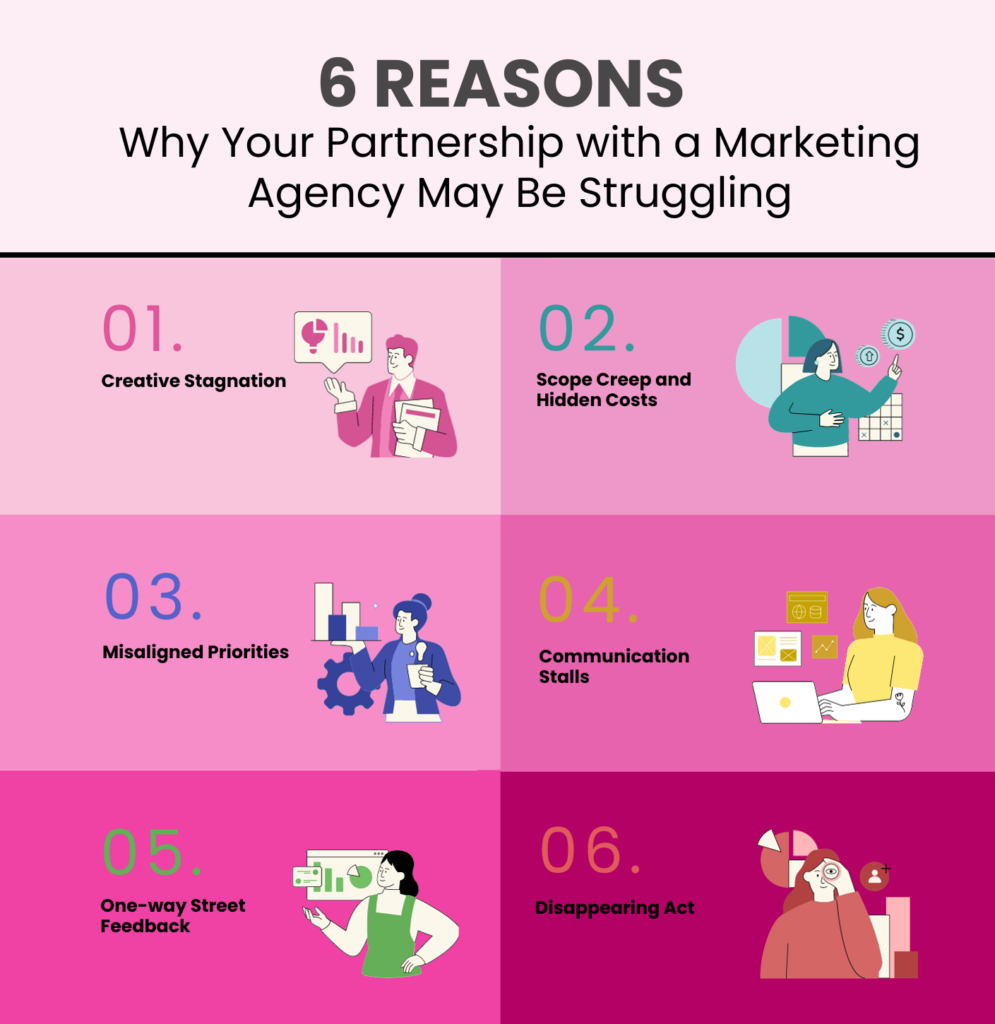
We’ve explored the hallmarks of a thriving agency client relationship, but what about the warning signs that that things could go wrong? Let’s delve into some red flags that could indicate a struggling partnership:
Communication Stalls
Infrequent updates, radio silence, or one-sided conversations point to a breakdown in trust and transparency.
Misaligned Priorities
If the agency prioritizes awards or their own goals over your KPIs, it’s time for a realignment.
Scope Creep and Hidden Costs
Unclear project boundaries and surprise expenses signal poor project management and a lack of trust.
Disappearing Act
If your initial contacts vanish and leave you with less experienced team members, it’s a bait-and-switch tactic.
Creative Stagnation
Formulaic campaigns or a lack of fresh ideas indicate the agency might be stuck in a rut.
One-way Street Feedback
If your concerns are dismissed or feedback is ignored, it’s a one-sided dynamic hindering collaboration.
Remember that communication is key! Addressing these concerns openly and honestly with your agency can often lead to course correction and a renewed sense of collaboration. But if the red flags keep waving, it might be time to re-evaluate the partnership and seek a better fit.
Final Words
Remember, these principles apply not just to evaluating existing relationships, but also to choosing a new agency. Don’t just focus on portfolios; delve deeper and seek out testimonials from existing clients to understand the agency’s work ethic, communication style, and commitment to collaboration.
Building a strong agency client relationship is a continuous journey, not a destination. By prioritizing trust, communication, and shared goals, you can create a partnership that fuels success and drives both parties to reach their full potential.
So, are you ready to harmonize your agency client relationship and create a masterpiece of collaboration? Start by implementing these tips and watch your partnership flourish!







